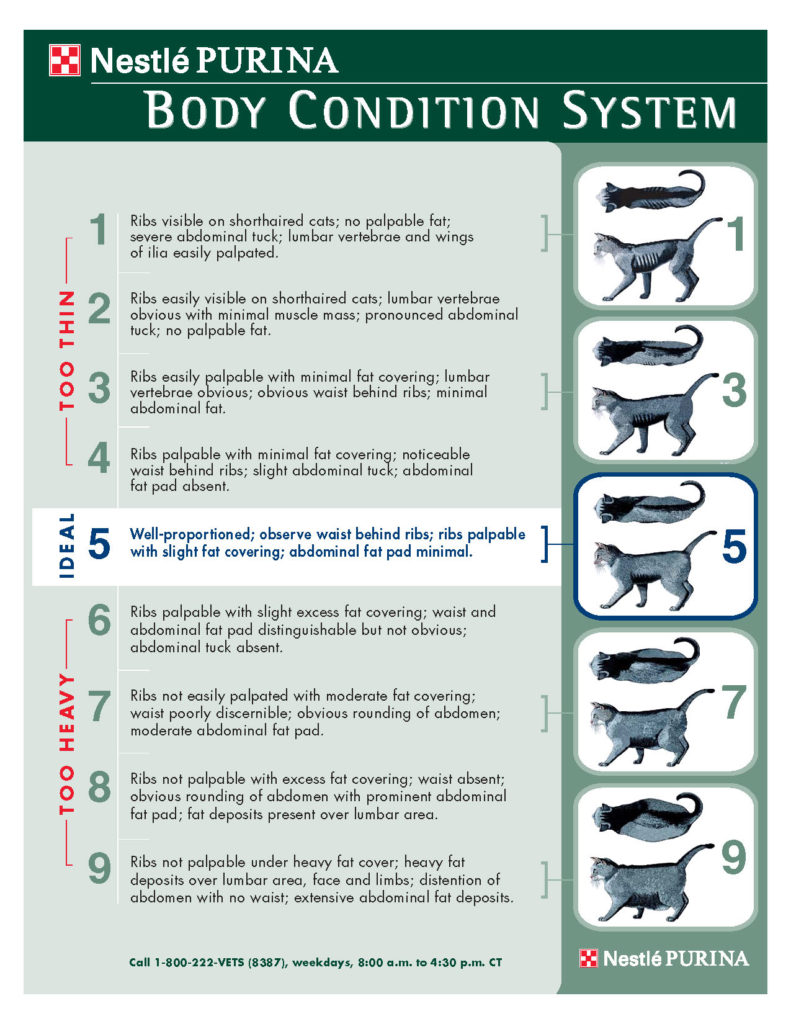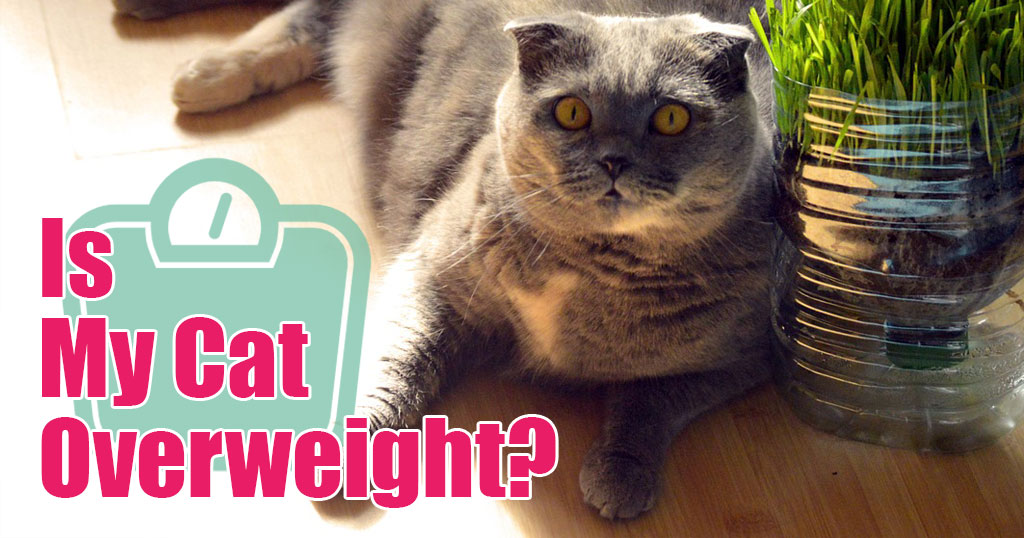Most cat parents are surprised to learn that their cat is overweight. As a society we have normalized a certain plump body condition for kitties. Think Garfield. Unfortunately, when cats are overweight, they are at a higher risk for conditions like diabetes and arthritis. In this article, I am going to teach you how to identify if your cat is overweight and how to fix it.
What is your cat’s number?
Yep! We are assigning your cat’s body a number. It feels superficial, so don’t share it with them. Veterinarians use a numbering system from 1-9 to better grade their patient’s body condition (1 being the thinnest and 9 being obese).
Below you will find the chart that includes a description of each body condition number. New research suggests that “4” is an ideal body condition. However, most cats that are spayed and neutered and kept indoors will never reach this condition. Let’s shoot for the number “5” and if your cat is a “7” or “8”, let’s move them down the number scale in a meaningful way. If you aren’t sure what number your kitty is, check with your veterinarian.

Weighing your cat can also be helpful. This gives you something more tangible to measure. I recommend weighing your cat once every week or two. If you get too obsessed, they might begin to resent daily weighing. You can buy a baby scale or cat scale here.
Diet
If your cat is overweight, this will be the most meaningful and impactful part of kitty’s weight loss plan. Kitties should be eating high protein, high moisture and low carbohydrate diets. Kibble is the opposite of this ideal. Even if you are feeding high quality grain free kibble, the amount of carbohydrates is simply too high. Excessive carbohydrates promote obesity and dental disease in cats. Removing kibble from your cat’s diet will almost always result in a significant amount of weight loss. If your cat is a typical carb junkie and refuses to accept this switch willingly, read my nurse’s article on tips and tricks to aid in this transition here.
If you aren’t feeding kibble, what should you be feeding?
I recommend canned and raw diets for my feline patients. You can also home cook for your kitty if you have the time resources. Canned diets will always be the easiest and fastest option. They are also full of moisture and readily available. My two favorite brands are Wellness and I and love and you. You can buy Wellness at Petsmart and I and love and you can be purchased at most grocery store chains.
Raw diets are a great choice for kitties as well. They come in many forms and shapes including raw patties, freeze-dried and dehydrated medallions. There are so many great brands on the market! My patients really like Stella & Chewys, Instinct, and Primal. When feeding canned and raw diets, your cat will prefer to eat 3-4 times daily as opposed to twice daily.
Home cooking can be a great option that requires a good deal of research and time resources. It’s important to create a balanced diet with the proper amount of vitamins and minerals. Cats are obligate carnivores and require muscle and organ meats for proper nutrition. You can find a veterinary nutritionist to help you create a customized recipe for your kitty.
If after switching to a canned, raw or home cooked diet,your kitty does not lose weight, consider having your veterinarian help you with a calorie count and a medical work up.
Exercise
Once you have your kitty’s diet in order, turn your attention to helping them receive regular and adequate exercise.
If your cat is overweight, here are a few ways to increase their daily physical activity:
- Supervised/safe outside time. Cats love being outside and having fresh air! Catios and special extensions on backyard fences help protect your kitty from getting out and predators from entering your space.
- Treat dispensing toys. There are several types of activity centers and treat dispensers that promote play. This treat dispensing ball can be filled with freeze dried treats to keep your kitty active.
- Stick & string toys. Most cats really like these toys. You get bonus points if you play with your cat right before feeding them a meal. This helps complete the prey cycle and relieves stress. Da Bird is my kitty’s favorite!
I would love to hear from you! Does your kitty need to lose weight? Leave a comment or question below!
Sending all my love,
Dr. Angie



Hello! This is more of a question; my cat is a 6. He HATES wet food. He has FIC and FLUTD so I’m limited as to his food (when my vet was saying wet! wet! wet! (and I was using the I and Love and My and Cat and then Weruva) he was getting worse. I tried a freeze dried raw diet in that time frame; he LOVES it dry, hates it wet and he got worse. He would rather starve than eat the special diet wet food. We have two cats, one is nice and slender so just feeding less means starving the slender one. Other than that the only choice currently on offer is to feed them like dogs; set mealtime, separate rooms with the attending riot and destruction, and God forbid I crash (I am not well and stress destroys me) and forget to feed someone or fail to give the epileptic dog her medication. I am trying to come up with a cat feeding solution (this is going slowly) that requires them to ‘work for it’ though the fat one is an Einstein and the slender on is……not. So, if you have a different suggestion, I am all ears. I am sure others are in this same boat.
Hi Jeanette,
Well, this is quite the conundrum!
I have heard of some folks using the microchip cat feeders, but I have not personally used these and it does require that both kitties have a microchip as well! I agree, feeding them intentionally at certain times would be ideal, but I also COMPLETELY understand that isn’t always realistic. What about multiple meals a day, so it’s structured but more snacking than a giant meal?
Will you keep us posted?!
Warmly,
Claire
Hello, thanks for your newsletters – I’ve found them so helpful! Re. cat weight: I have a cat with IBS – I’ve really been focusing on learning more about his condition, and seeing what helps him. Feeding him little and often seems to really help combat the build-up of stomach acid, and he seems to be doing really well (touch wood!). The vet also recommended giving him more cat biscuits to help with his teeth, which he seems to enjoy. However, he definitely has a little bit of a belly! Is it possible to manage the IBS AND reduce his weight? If it’s a choice, I would prioritise the IBS – his weight dropped alarmingly prior to starting on steroids, so it’s a huge relief to see him looking healthier (if a bit plump!). Any advice welcomed – thank you. 🙂
Hi Romayne,
I am so glad that you enjoy Dr. Angie’s newsletters!
Well, first, I want to make sure you’ve read Dr. Angie’s IBD articles! You can find Part One here, and Part Two here.
Typically, Dr. Angie recommends low-carb diets for kitties with IBD, which tend to equal canned or raw diets. These diets are also the BEST for weight loss. So, it’s a win-win!!!
Hugs,
Claire